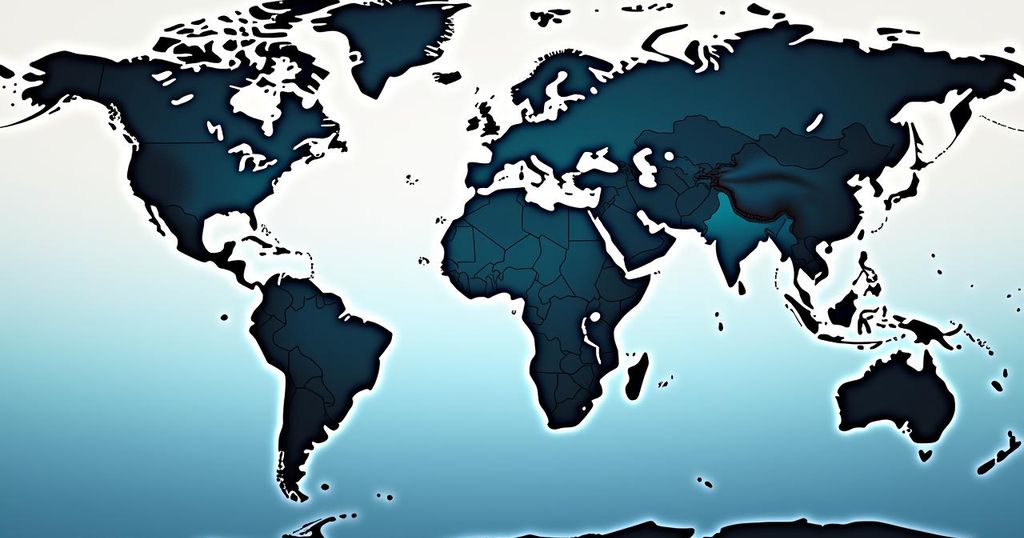UN Issues Urgent Warning on the Erratic Global Water Cycle
The UN warns that climate change is making the global water cycle increasingly erratic, leading to severe floods and droughts. In 2023, rivers reached their driest levels in over 30 years, with glaciers experiencing unprecedented ice loss. The report highlights the disproportionate impact on Africa and emphasizes the urgent need for improved water management and climate action to ensure global water security.
The United Nations has issued a stark warning regarding the increasing unpredictability of the global water cycle, attributed primarily to climate change. The World Meteorological Organization (WMO) reported that 2023 witnessed an alarming high in both floods and droughts, indicative of a disturbing trend. Last year, the world’s rivers experienced their most severe dryness in over three decades, while glaciers recorded their most significant ice loss in half a century. WMO Secretary-General Celeste Saulo characterized this situation as a “distress signal,” emphasizing that the erratic water cycle poses grave threats to lives, ecosystems, and economies worldwide. She noted, “Water is the canary in the coalmine of climate change.” The impact of the climate crisis has resulted in extreme weather phenomena, with last year marking the hottest on record alongside significant drought conditions. The report highlights that while natural climate variations, such as La Niña and El Niño, play roles in these extreme weather events, human-induced climate change is increasingly a dominant factor. Saulo explained that the warmer atmosphere retains more moisture, leading to heavy rainfall, while rapid evaporation exacerbates drought conditions. The situation is particularly dire in Africa, where severe flooding in Libya in September 2023 alone claimed over 11,000 lives. Globally, approximately 3.6 billion people are estimated to lack regular access to fresh water, with projections indicating this could escalate to over five billion by 2050. Furthermore, current hydrological data suggest that more than half of river catchments are experiencing reduced water levels, resulting in diminished inflows to reservoirs. Additionally, glaciers are undergoing unprecedented rates of melting, with estimates indicating a loss of more than 600 billion tonnes of water, the worst observed in five decades. Saulo cautioned that the consequences of this ice melt endanger long-term water security for millions. To mitigate these challenges, the WMO calls for enhanced monitoring of fresh water resources and emphasizes the need for early warning systems to minimize the impact on communities and wildlife. Furthermore, the organization advocates for urgent action to curtail greenhouse gas emissions, highlighting the importance of water conservation practices in agriculture, which consumes approximately 70% of global fresh water. Saulo noted that without stabilizing the climate, it will be exceedingly difficult to revert to a more predictable natural water cycle. The WMO emphasizes the importance of robust infrastructure development to safeguard water resources and protect populations from environmental hazards. In conclusion, addressing these water cycle disruptions is crucial for ensuring the sustainability and security of global water resources amidst an ever-changing climate. Overall, the United Nations report serves as a wake-up call for urgent action to address the formidable challenges posed by an erratic water cycle driven by climate change.
The article discusses the alarming fluctuations in the global water cycle due to climate change, as reported by the United Nations’ World Meteorological Organization. The increased incidence of extreme weather events, such as floods and droughts, has significant implications for global water security, human health, and economic stability. Understanding the current state of global water resources is essential to address the challenges of climate-induced disruptions.
In summary, the United Nations’ warning about the unpredictability of the global water cycle underscores the urgent need for action to combat climate change and its consequences on water resources. The findings suggest that without significant intervention, billions of individuals may face increasingly severe water shortages in the future. Mitigating these impacts requires improved monitoring and management of water resources and a concerted effort to reduce greenhouse gas emissions.
Original Source: phys.org




Post Comment